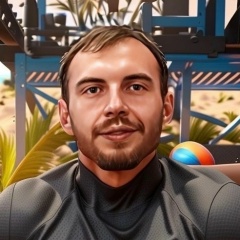Я, конечно, не ура-патриот, но вот такое читать приятно.
ИСПОВЕДЬ ЛЕЙТЕНАНТА МОРСКОЙ ПЕХОТЫ
Меня зовут Майкл Фогетти, я капитан Корпуса Морской пехоты* США в отставке. Недавно я увидел в журнале, фотографию русского памятника из Трептов-парка* в Берлине и вспомнил один из эпизодов своей службы. История эта произошла лет тридцать назад в Африке. Мой взвод после выполнения специальной операции, получил приказ ждать эвакуации в заданной точке, но в точку эту попасть мы так и не смогли.
В районе Золотого рога как всегда было жарко во всех смыслах этого слова. Местным жителям явно было мало одной революции. Им надо было их минимум три, пару гражданских войн и в придачу один религиозный конфликт. Мы выполнили задание и теперь спешили в точку рандеву с катером, на котором и должны были прибыть к месту эвакуации. Но нас поджидал сюрприз. На окраине небольшого приморского городка нас встретили суетливо толкущиеся группки вооруженных людей. Они косились на нас, но не трогали, ибо колонна из пяти джипов, ощетинившаяся стволами М-16* и М-60*, вызывала уважение. Вдоль улицы периодически попадались легковые автомобили со следами обстрела и явного разграбления, но именно эти объекты и вызывали основной интерес пейзан, причем вооруженные мародеры имели явный приоритет перед невооруженными. Когда мы заметили у стен домов несколько трупов явных европейцев, я приказал быть наготове, но без приказа огонь не открывать. В эту минуту из узкого переулка выбежала белая женщина с девочкой на руках, за ней с хохотом следовало трое местных нигеров (извините, афро-африканцев). Нам стало не до политкорректности. Женщину с ребенком мгновенно втянули в джип, а на ее преследователей цыкнули и недвусмысленно погрозили стволом пулемета, но опьянение безнаказанностью и пролитой кровью сыграло с мерзавцами плохую шутку. Один из них поднял свою G-3* и явно приготовился в нас стрелять, Marine Колоун автоматически нажал на гашетку пулемета и дальше мы уже мчались под все усиливающуюся стрельбу. Хорошо еще, что эти уроды не умели метко стрелять. Мы взлетели на холм, на котором собственно и располагался город, и увидели внизу панораму порта, самым ярким фрагментом которой был пылающий у причала пароход.
В порту скопилось больше тысячи европейских гражданских специалистов и членов их семей. Учитывая то, что в прилегающей области объявили независимость и заодно джихад, все они жаждали скорейшей эвакуации. Как было уже сказано выше, корабль, на котором должны были эвакуировать беженцев, весело пылал на рейде, на окраинах города сосредотачивались толпы инсургентов, а из дружественных сил был только мой взвод с шестью пулеметами и скисшей рацией (уоки-токи* не в счет). У нас было плавсредство, готовое к походу и прекрасно замаскированный катер, но туда могли поместиться только мы. Бросить на произвол судьбы женщин и детей мы не имели права. Я обрисовал парням ситуацию и сказал, что остаюсь здесь и не в праве приказывать кому - либо из них оставаться со мной, и что приказ о нашей эвакуации в силе и катер на ходу. Но к чести моих ребят, остались все. Я подсчитал наличные силы... двадцать девять марин, включая меня, семь демобилизованных французских легионеров и 11 матросов с затонувшего парохода, две дюжины добровольцев из гражданского контингента. Порт во времена Второй мировой войны был перевалочной базой и несколько десятков каменных пакгаузов, окруженных солидной стеной с башенками и прочими архитектурными излишествами прошлого века, будто сошедшие со страниц Киплинга и Буссенара, выглядели вполне солидно и пригодно для обороны. Вот этот комплекс и послужили нам новым фортом Аламо. Плюс в этих пакгаузах были размещены склады с ООНовской гуманитарной помощью, там же были старые казармы, в которых работали и водопровод и канализация, конечно туалетов было маловато на такое количество людей, не говоря уже о душе, но лучше это, чем ничего. Кстати, половина одного из пакгаузов была забита ящиками с неплохим виски. Видимо кто - то из чиновников ООН делал тут свой небольшой гешефт. То есть вся ситуация, помимо военной, была нормальная, а военная ситуация была следующая.
ИСПОВЕДЬ ЛЕЙТЕНАНТА МОРСКОЙ ПЕХОТЫ
Меня зовут Майкл Фогетти, я капитан Корпуса Морской пехоты* США в отставке. Недавно я увидел в журнале, фотографию русского памятника из Трептов-парка* в Берлине и вспомнил один из эпизодов своей службы. История эта произошла лет тридцать назад в Африке. Мой взвод после выполнения специальной операции, получил приказ ждать эвакуации в заданной точке, но в точку эту попасть мы так и не смогли.
В районе Золотого рога как всегда было жарко во всех смыслах этого слова. Местным жителям явно было мало одной революции. Им надо было их минимум три, пару гражданских войн и в придачу один религиозный конфликт. Мы выполнили задание и теперь спешили в точку рандеву с катером, на котором и должны были прибыть к месту эвакуации. Но нас поджидал сюрприз. На окраине небольшого приморского городка нас встретили суетливо толкущиеся группки вооруженных людей. Они косились на нас, но не трогали, ибо колонна из пяти джипов, ощетинившаяся стволами М-16* и М-60*, вызывала уважение. Вдоль улицы периодически попадались легковые автомобили со следами обстрела и явного разграбления, но именно эти объекты и вызывали основной интерес пейзан, причем вооруженные мародеры имели явный приоритет перед невооруженными. Когда мы заметили у стен домов несколько трупов явных европейцев, я приказал быть наготове, но без приказа огонь не открывать. В эту минуту из узкого переулка выбежала белая женщина с девочкой на руках, за ней с хохотом следовало трое местных нигеров (извините, афро-африканцев). Нам стало не до политкорректности. Женщину с ребенком мгновенно втянули в джип, а на ее преследователей цыкнули и недвусмысленно погрозили стволом пулемета, но опьянение безнаказанностью и пролитой кровью сыграло с мерзавцами плохую шутку. Один из них поднял свою G-3* и явно приготовился в нас стрелять, Marine Колоун автоматически нажал на гашетку пулемета и дальше мы уже мчались под все усиливающуюся стрельбу. Хорошо еще, что эти уроды не умели метко стрелять. Мы взлетели на холм, на котором собственно и располагался город, и увидели внизу панораму порта, самым ярким фрагментом которой был пылающий у причала пароход.
В порту скопилось больше тысячи европейских гражданских специалистов и членов их семей. Учитывая то, что в прилегающей области объявили независимость и заодно джихад, все они жаждали скорейшей эвакуации. Как было уже сказано выше, корабль, на котором должны были эвакуировать беженцев, весело пылал на рейде, на окраинах города сосредотачивались толпы инсургентов, а из дружественных сил был только мой взвод с шестью пулеметами и скисшей рацией (уоки-токи* не в счет). У нас было плавсредство, готовое к походу и прекрасно замаскированный катер, но туда могли поместиться только мы. Бросить на произвол судьбы женщин и детей мы не имели права. Я обрисовал парням ситуацию и сказал, что остаюсь здесь и не в праве приказывать кому - либо из них оставаться со мной, и что приказ о нашей эвакуации в силе и катер на ходу. Но к чести моих ребят, остались все. Я подсчитал наличные силы... двадцать девять марин, включая меня, семь демобилизованных французских легионеров и 11 матросов с затонувшего парохода, две дюжины добровольцев из гражданского контингента. Порт во времена Второй мировой войны был перевалочной базой и несколько десятков каменных пакгаузов, окруженных солидной стеной с башенками и прочими архитектурными излишествами прошлого века, будто сошедшие со страниц Киплинга и Буссенара, выглядели вполне солидно и пригодно для обороны. Вот этот комплекс и послужили нам новым фортом Аламо. Плюс в этих пакгаузах были размещены склады с ООНовской гуманитарной помощью, там же были старые казармы, в которых работали и водопровод и канализация, конечно туалетов было маловато на такое количество людей, не говоря уже о душе, но лучше это, чем ничего. Кстати, половина одного из пакгаузов была забита ящиками с неплохим виски. Видимо кто - то из чиновников ООН делал тут свой небольшой гешефт. То есть вся ситуация, помимо военной, была нормальная, а военная ситуация была следующая.
Of course, I am not a patriot, but it’s nice to read this.
CONFESSION OF THE LIEUTENANT OF THE MARITIME DECK
My name is Michael Fogetti, I am the captain of the United States Marine Corps * retired. Recently I saw in a magazine a photograph of a Russian monument from Treptow Park * in Berlin and remembered one of the episodes of my service. This story happened about thirty years ago in Africa. My platoon after performing a special operation, received an order to wait for evacuation at a given point, but we could not get to this point.
In the area of the Golden Horn, as always, it was hot in every sense of the word. Locals clearly was not enough one revolution. They needed at least three of them, a couple of civil wars and, in addition, one religious conflict. We completed the task and now hurried to the rendezvous point with the boat, on which we were to arrive at the place of evacuation. But we were waiting for a surprise. On the outskirts of a small seaside town, we were greeted by fussingly crowded groups of armed men. They looked at us, but did not touch, because a column of five jeeps, bristling with the trunks of the M-16 * and M-60 *, caused respect. Along the street, cars with traces of shelling and blatant looting periodically came across, but it was these objects that caused the main interest of peyzans, and armed marauders had a clear priority over unarmed ones. When we noticed several corpses of obvious Europeans near the walls of the houses, I ordered to be on the alert, but without an order not to open fire. At that moment, a white woman with a girl in her arms ran out of a narrow alley, followed by three local niggas (sorry, African-Africans) with laughter. We were not up to political correctness. The woman with the child was instantly dragged into the jeep, and her pursuers were squeezed and unequivocally threatened with a machine gun barrel, but intoxication with impunity and shed blood played a bad joke on the bastards. One of them raised his G-3 * and was clearly prepared to shoot at us, Marine Kolone automatically pressed the machine gun trigger and then we raced under the ever-increasing firing. It is good that these freaks did not know how to shoot straight. We flew up to the hill on which the city was actually located, and saw the port panorama below, the brightest fragment of which was a steamboat blazing at the pier.
The port has accumulated more than a thousand European civilian specialists and their families. Considering that independence was declared in the adjoining area and at the same time jihad, they all yearned for the speediest evacuation. As mentioned above, the ship, on which they were supposed to evacuate the refugees, blazed merrily on the roadstead, on the outskirts of the city crowds of insurgents concentrated, and from friendly forces there was only my platoon with six machine guns and a sour walkie-talkie (walkie-toki * do not count) . We had a floating craft ready for a hike and a perfectly camouflaged boat, but only we could fit there. We had no right to abandon women and children to the mercy of fate. I described the situation to the guys and said that I stay here and have no right to order any of them to remain with me, and that the order for our evacuation is in force and the boat is on the move. But to the credit of my guys, everything remained. I calculated the available forces ... twenty-nine marines, including me, seven demobilized French legionaries and 11 sailors from a sunken steamer, two dozen civilian volunteers. The port during the Second World War was a transshipment base and several dozen stone warehouses surrounded by a solid wall with turrets and other architectural excesses of the last century, as if descended from the pages of Kipling and Bussenar, looked quite solid and suitable for defense. This complex and served us a new fort Alamo. Plus, in these warehouses were placed warehouses with UN humanitarian aid, there were also old barracks, in which both the water supply and sewage system worked, of course there were not enough toilets for so many people, not to mention the soul, but this is better than nothing. By the way, half of one of the warehouses was crammed with drawers with good whiskey. Apparently one of the UN officials did his little gesheft here. That is, the whole situation, in addition to the military, was normal, and the military situation was as follows.
CONFESSION OF THE LIEUTENANT OF THE MARITIME DECK
My name is Michael Fogetti, I am the captain of the United States Marine Corps * retired. Recently I saw in a magazine a photograph of a Russian monument from Treptow Park * in Berlin and remembered one of the episodes of my service. This story happened about thirty years ago in Africa. My platoon after performing a special operation, received an order to wait for evacuation at a given point, but we could not get to this point.
In the area of the Golden Horn, as always, it was hot in every sense of the word. Locals clearly was not enough one revolution. They needed at least three of them, a couple of civil wars and, in addition, one religious conflict. We completed the task and now hurried to the rendezvous point with the boat, on which we were to arrive at the place of evacuation. But we were waiting for a surprise. On the outskirts of a small seaside town, we were greeted by fussingly crowded groups of armed men. They looked at us, but did not touch, because a column of five jeeps, bristling with the trunks of the M-16 * and M-60 *, caused respect. Along the street, cars with traces of shelling and blatant looting periodically came across, but it was these objects that caused the main interest of peyzans, and armed marauders had a clear priority over unarmed ones. When we noticed several corpses of obvious Europeans near the walls of the houses, I ordered to be on the alert, but without an order not to open fire. At that moment, a white woman with a girl in her arms ran out of a narrow alley, followed by three local niggas (sorry, African-Africans) with laughter. We were not up to political correctness. The woman with the child was instantly dragged into the jeep, and her pursuers were squeezed and unequivocally threatened with a machine gun barrel, but intoxication with impunity and shed blood played a bad joke on the bastards. One of them raised his G-3 * and was clearly prepared to shoot at us, Marine Kolone automatically pressed the machine gun trigger and then we raced under the ever-increasing firing. It is good that these freaks did not know how to shoot straight. We flew up to the hill on which the city was actually located, and saw the port panorama below, the brightest fragment of which was a steamboat blazing at the pier.
The port has accumulated more than a thousand European civilian specialists and their families. Considering that independence was declared in the adjoining area and at the same time jihad, they all yearned for the speediest evacuation. As mentioned above, the ship, on which they were supposed to evacuate the refugees, blazed merrily on the roadstead, on the outskirts of the city crowds of insurgents concentrated, and from friendly forces there was only my platoon with six machine guns and a sour walkie-talkie (walkie-toki * do not count) . We had a floating craft ready for a hike and a perfectly camouflaged boat, but only we could fit there. We had no right to abandon women and children to the mercy of fate. I described the situation to the guys and said that I stay here and have no right to order any of them to remain with me, and that the order for our evacuation is in force and the boat is on the move. But to the credit of my guys, everything remained. I calculated the available forces ... twenty-nine marines, including me, seven demobilized French legionaries and 11 sailors from a sunken steamer, two dozen civilian volunteers. The port during the Second World War was a transshipment base and several dozen stone warehouses surrounded by a solid wall with turrets and other architectural excesses of the last century, as if descended from the pages of Kipling and Bussenar, looked quite solid and suitable for defense. This complex and served us a new fort Alamo. Plus, in these warehouses were placed warehouses with UN humanitarian aid, there were also old barracks, in which both the water supply and sewage system worked, of course there were not enough toilets for so many people, not to mention the soul, but this is better than nothing. By the way, half of one of the warehouses was crammed with drawers with good whiskey. Apparently one of the UN officials did his little gesheft here. That is, the whole situation, in addition to the military, was normal, and the military situation was as follows.
У записи 1 лайков,
0 репостов.
0 репостов.
Эту запись оставил(а) на своей стене Лена Смирнова






















